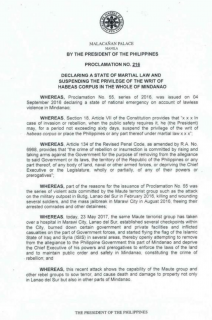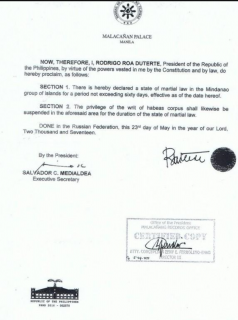(Eagle News) — Malacañang sent President Rodrigo Duterte’s official declaration of martial law in Mindanao to Congress on Wednesday night for review and approval.
The office of House Speaker Pantaleon Alvarez received a certified copy of Proclamation No. 216 at 10:26 p.m. from the Malacanang Records Office, a full 24 hours since martial law was declared in Mindanao by Presidential Spokesperson Ernesto Abella in Moscow, Russia, where President Duterte was then in an official visit.
Proclamation No. 216, “done in the Russian Federation” declares martial law in the “whole of Mindanao” for a period “not exceeding 60 days.” It was dated May 23, Tuesday.
The proclamation was titled, “Declaring a state of martial law and suspending the privilege of the writ of habeas corpus in the whole of Mindanao.”
“Whereas Proclamation No. 55, series of 2016, was issued on 04 September 2016, declaring a state of national emergency on account of lawless violence in Mindanao.
“Whereas, Section 18, Article VII of the Constitution provides that “in case of invasion or rebellion, when the public safety requires it, he (the President) may, for a period of not exceeding 60 days, suspend the privilege of the writ of habeas corpus or place the Philippines or any part thereof under martial law,” read the first two paragraphs of the proclamation that is set to either be revoked or approved by Congress.
It then cited Article 134 of the Revised Penal Code, as amended by R.A. No. 6968, which provides that “the crime of rebellion or insurrection is committed by rising and taking arms against the Government for the purpose of removing from the allegiance to said Government or its laws….”
It then explained that the reason for the issuance of the earlier proclamation no. 55 was the series of violent acts committed by the Maute terrorist group, such as the attack on the military outpost in Butig, Lanao del Sur in February 2016, which killed and wounded several soldiers, and the mass jailbreak in Marawi City in August 2016, when they freed their arrested comrades and other detainees.
The proclamation then cited the May 23 events that saw the Maute group “(taking over) a hospital in Marawi City, Lanao del Sur, (establishing) several checkpoints within the city, (burning down) certain government and private facilities and (inflicting) casualties on the part of Government forces, and private facilities.”
It added that Maute has also killed members of the government forces, and “started flying the flag of the Islamic State of Iraq and Syria( ISIS) in several areas.”
It said these moves are an open attempt to “remove from the allegiance to the Philippine government this part of Mindanao, and deprive the Chief Executive of his powers and prerogatives to enforce the laws of the land and to maintain public order and safety in Mindanao, constituting the crime of rebellion.”
“This recent attack shows the capability of the Maute group and other rebel groups to sow terror, and cause death and damage to property not only in Lanao del Sur but also in other parts of Mindanao,” read Duterte’s martial law proclamation.
These were the reasons that Duterte said justified the imposition of a 60-day martial law in Mindanao, which also saw the writ of habeas corpus suspended.
According to Section 18 Article VII of the 1987 Philippine Constitution, the President shall submit a report in person or in writing to the Congress within 48 hours from the proclamation of martial law or the suspension of the privilege of the writ of habeas corpus.
Then “Congress, voting jointly, by a vote of at least a majority of all its Members in regular or special session, may revoke such proclamation or suspension, which revocation shall not be set aside by the President.”


Aside from this, the Constitution also said that, “upon the initiative of the President, the Congress may, in the same manner, extend such proclamation or suspension for a period to be determined by the Congress, if the invasion or rebellion shall persist and public safety requires it.”
“Congress, if not in session, shall, within twenty-four hours following such proclamation or suspension, convene in accordance with its rules without need of a call.”
“The Supreme Court may review, in an appropriate proceeding filed by any citizen, the sufficiency of the factual basis of the proclamation of martial law or the suspension of the privilege of the writ of habeas corpus or the extension thereof, and must promulgate its decision thereon within thirty days from its filing,” further stated the provisions of the Philippine Constitution.
https://youtu.be/eQjjpJYvjLI







